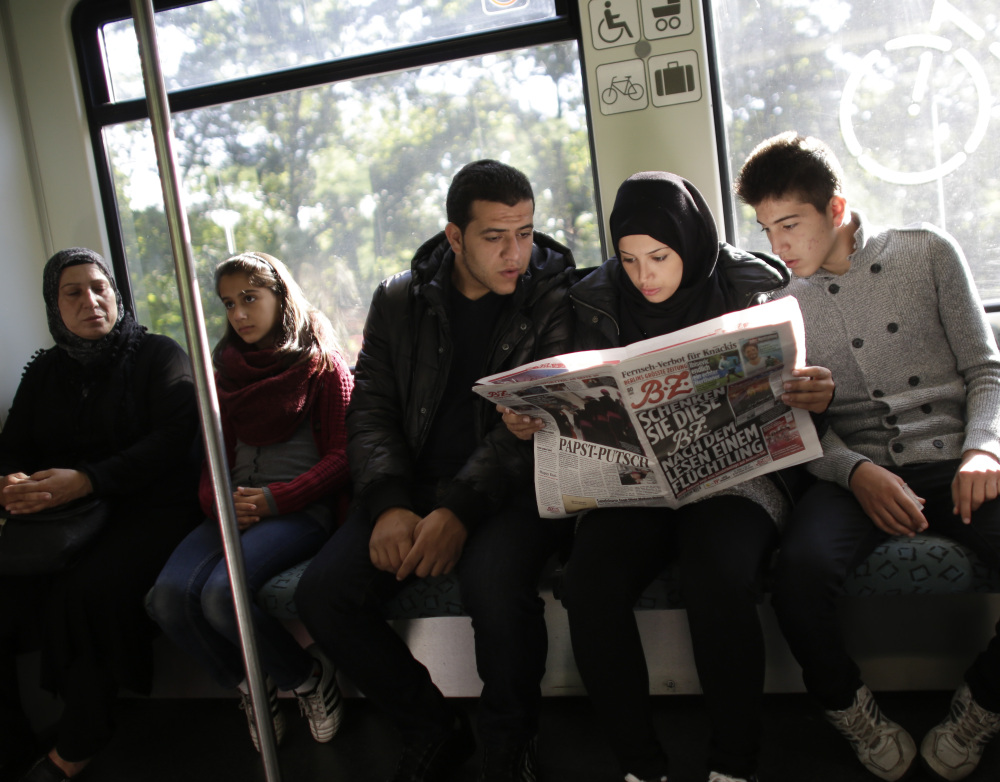BERLIN — The Syrian family asks with wonder why they didn’t die like thousands of others like them: killed by bombs in their native Damascus; drowned by the rough waves of the Mediterranean; or suffocated in overcrowded trucks speeding them through Europe.
“Sometimes I wake up and I feel like, thank God, I’m alive,” says 19-year-old Reem Habashieh, who with her loved-ones survived a harrowing 16-day flight from Syria to arrive last week in Berlin – amazed they all made it. “I’m lucky, I’m a blessed person.”
Habashieh, her mother and three younger siblings are five of the 37,000 who have flooded into Germany this month. Now they’re embarking on another unknown journey, trying to start a new life in a country full of strange people, cold rain, unfamiliar smells and voices they don’t understand.
Fear still fills Habashieh’s big green-brown eyes when she recounts their epic trek across Europe last month.
“We had to hide between the trees, run through sunflower and cornfields and walk all night,” Habashieh says, tucking in a loose tail of her gray woolen hijab. “There were scary animals, people were mean, we had to sleep under the sky – it was very dangerous.”
But excitement and youthful curiosity shine through as she describes her family’s arrival in Berlin – how she led her family on buses, subways and commuter trains through the capital, and organized essential first steps like registering to apply for asylum.
Raghad, Reem’s 11-year-old sister, a skinny girl with long brown hair and a big smile, got so tired along the way that Mohammed, her burly 17-year-old brother, sometimes had to carry her for hours.
Khawla Kareem, their 44-year-old mother, says she’s still exhausted from the odyssey, but that her maternal urge to bring her four children to safety filled her with the power she needed. Her husband died three years ago; being left alone to care for the children amid a brutal civil war led her to the difficult decision of leaving everything behind and fleeing Syria.
It was also three years ago that the war hit home, as the front line between President Bashar Assad’s Syrian army and the rebel Free Syrian Army came to the Damascus street they lived on – and they were literally caught in the crossfire.
She remembers how life during the war simply stopped for them.
“Somehow you’re just sitting there, you don’t know anything about tomorrow, you don’t know if you are going to be alive.”
So earlier this year Khawla Kareem, an elementary school teacher, scraped together $13,400, selling the family car, and bought plane tickets to Bodrum on the Mediterranean Coast in Turkey. She paid traffickers to take them across the sea in a small rubber boat to the Greek island of Samos.
They took a ferry from Samos to Athens, then worked their way through Macedonia and Serbia into Hungary, where the mother hired another human smuggler. He spirited them across borders on his minibus with dark tinted windows and north to Berlin, dropping them off on the outskirts of the city last week.
As a mother, Kareem is a bit cautious. She is relieved she managed to bring her family to Germany, saying it’s “a welcoming and helpful country for refugees and they respect the hijab and Islam here.”
But, she says quietly, “my heart will always be in Damascus.”
Send questions/comments to the editors.



Success. Please wait for the page to reload. If the page does not reload within 5 seconds, please refresh the page.
Enter your email and password to access comments.
Hi, to comment on stories you must . This profile is in addition to your subscription and website login.
Already have a commenting profile? .
Invalid username/password.
Please check your email to confirm and complete your registration.
Only subscribers are eligible to post comments. Please subscribe or login first for digital access. Here’s why.
Use the form below to reset your password. When you've submitted your account email, we will send an email with a reset code.